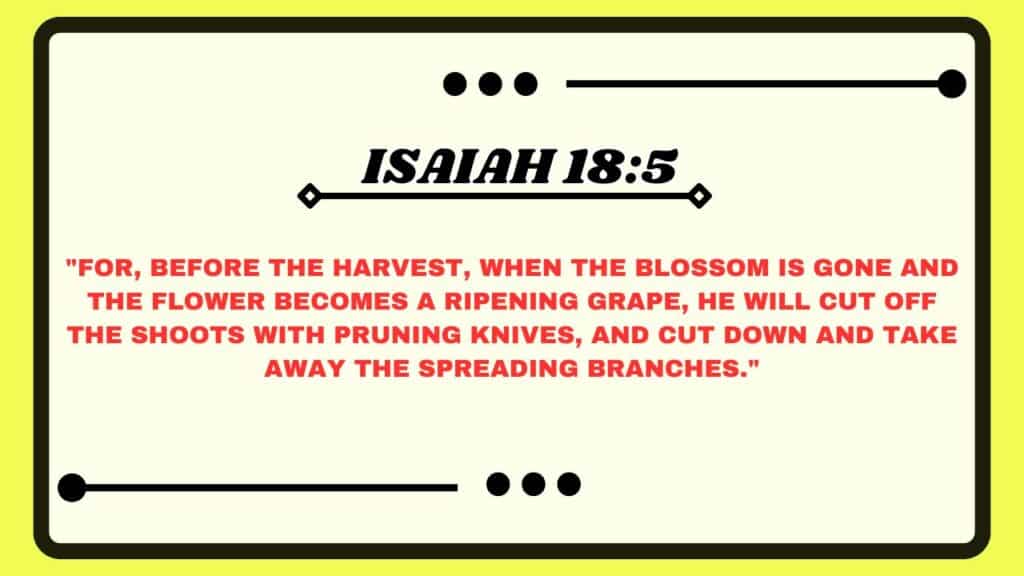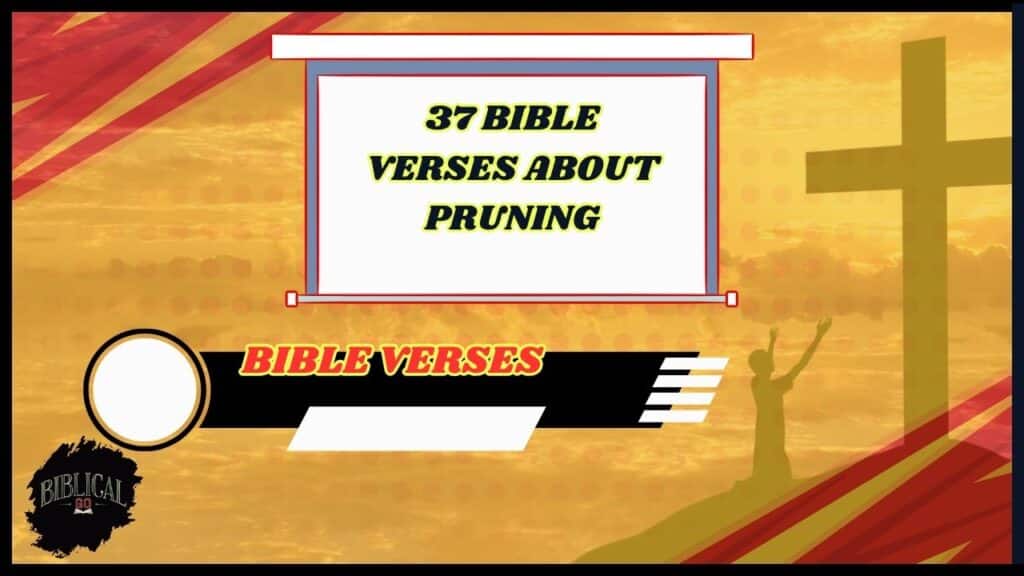Bible Verses About Pruning: Pruning is one of the most powerful metaphors in scripture. Just as a gardener carefully cuts away dead branches to encourage new growth, God works in our lives to remove what hinders our spiritual development. This process sometimes painful but always purposeful appears throughout the Bible as a testament to God’s loving refinement.
The concept of pruning in scripture reveals an essential truth: sometimes what appears to be loss is actually preparation for greater fruitfulness. When God prunes aspects of our lives, He does so not to harm but to heal, not to diminish but to develop our potential.
Whether you’re experiencing a season of apparent loss, seeking to understand God’s refining work, or simply wanting to grow spiritually, these verses about pruning offer profound insight and encouragement for your journey.
Also Read: How to Get the Competitive Edge The Serpentrogue Way
The Divine Purpose of Pruning
John 15:1-2
“I am the true vine, and my Father is the gardener. He cuts off every branch in me that bears no fruit, while every branch that does bear fruit he prunes so that it will be even more fruitful.”
These words from Jesus establish the foundational metaphor of spiritual pruning. God removes what is unproductive in our lives while refining what is already bearing fruit. This verse reminds us that pruning isn’t punishment but preparation God sees potential in us that requires cultivation.
Isaiah 18:5
“For, before the harvest, when the blossom is gone and the flower becomes a ripening grape, he will cut off the shoots with pruning knives, and cut down and take away the spreading branches.”

Isaiah uses agricultural imagery to illustrate God’s timing in pruning. Just as there is a precise moment to prune vines for optimal growth, God knows exactly when to intervene in our lives. This verse teaches us to trust God’s perfect timing, even when His pruning seems inconvenient or painful.
Hebrews 12:10-11
“God disciplines us for our good, in order that we may share in his holiness. No discipline seems pleasant at the time, but painful. Later on, however, it produces a harvest of righteousness and peace for those who have been trained by it.”
While not explicitly using pruning language, this passage captures its essence. God’s discipline is temporary discomfort for lasting character development. The pain of pruning yields the peaceful fruit of righteousness when we submit to the process rather than resist it.
Ezekiel 17:24
“All the trees of the forest will know that I the Lord bring down the tall tree and make the low tree grow tall. I dry up the green tree and make the dry tree flourish. I the Lord have spoken, and I will do it.”
God’s pruning often reverses what seems natural to us the tall are brought low while the humble are lifted up. This verse encourages us that God’s pruning has resurrection power, bringing life where there was death and transforming what appeared worthless into something valuable.
Pruning as Spiritual Refinement
Malachi 3:2-3
“But who can endure the day of his coming? Who can stand when he appears? For he will be like a refiner’s fire or a launderer’s soap. He will sit as a refiner and purifier of silver; he will purify the Levites and refine them like gold and silver.”
This passage uses metallurgy instead of gardening to describe God’s purifying work. Just as precious metals require intense heat to remove impurities, our spiritual growth often comes through fiery trials. The refiner’s goal is not destruction but purification making us more valuable by removing what diminishes our worth.
Job 14:7-9
“At least there is hope for a tree: If it is cut down, it will sprout again, and its new shoots will not fail. Its roots may grow old in the ground and its stump die in the soil, yet at the scent of water it will bud and put forth shoots like a plant.”
Job’s reflection offers hope during severe pruning seasons. Even what appears to be total destruction can become the foundation for new life. This verse reminds us that God can bring renewal from what seems irrevocably lost, with even our deepest roots responding to His refreshment.
Isaiah 27:2-3
“In that day ‘Sing about a fruitful vineyard: I, the Lord, watch over it; I water it continually. I guard it day and night so that no one may harm it.'”
God’s pruning is paired with His protection and provision. While He removes what doesn’t belong, He simultaneously nourishes what remains. This verse assures us that pruning isn’t abandonment God remains attentive to our needs throughout the process of refinement.
Psalm 94:12-13
“Blessed is the one you discipline, Lord, the one you teach from your law; you grant them relief from days of trouble, till a pit is dug for the wicked.”

The psalmist recognizes discipline as a blessing rather than a curse. God’s pruning is evidence of His commitment to our growth, not His rejection. This verse helps us reframe difficult seasons as demonstrations of divine love rather than divine anger.
Also Read: 37 Important Bible Verses About Loyalty
Pruning for Greater Fruitfulness
John 15:5-6
“I am the vine; you are the branches. If you remain in me and I in you, you will bear much fruit; apart from me you can do nothing. If you do not remain in me, you are like a branch that is thrown away and withers; such branches are picked up, thrown into the fire and burned.”
Jesus continues the vineyard metaphor, emphasizing our complete dependence on Him for productivity. Pruning removes what interferes with our connection to Christ, the source of all spiritual vitality. This verse teaches us that remaining connected to Jesus is essential for surviving and thriving through seasons of pruning.
Galatians 5:22-23
“But the fruit of the Spirit is love, joy, peace, forbearance, kindness, goodness, faithfulness, gentleness and self-control. Against such things there is no law.”
This familiar passage identifies what God is cultivating through His pruning work. When certain relationships, habits, or pursuits are removed from our lives, it’s often to make room for these spiritual qualities to flourish. The pruning process is ultimately about character development, not punishment.
Philippians 1:6
“Being confident of this, that he who began a good work in you will carry it on to completion until the day of Christ Jesus.”
Paul reassures believers that God’s refining work has both purpose and completion. Pruning isn’t random or endless it’s part of a masterful plan that God will faithfully finish. This verse encourages patience during painful seasons, knowing that God isn’t finished with us yet.
Romans 5:3-5
“Not only so, but we also glory in our sufferings, because we know that suffering produces perseverance; perseverance, character; and character, hope. And hope does not put us to shame, because God’s love has been poured out into our hearts through the Holy Spirit, who has been given to us.”
Paul outlines the developmental process that pruning initiates. What begins as painful suffering ultimately produces steadfast hope. This verse reveals the sequential nature of spiritual growth each difficult season builds upon the previous one to develop lasting spiritual maturity.
Also Read: 36 Bible Verses About Anchors
Pruning in Personal Transformation
2 Corinthians 3:18
“And we all, who with unveiled faces contemplate the Lord’s glory, are being transformed into his image with ever-increasing glory, which comes from the Lord, who is the Spirit.”
Transformation into Christ’s image is the ultimate purpose of pruning. God removes what doesn’t reflect His character so that His glory becomes increasingly visible in us. This verse reminds us that pruning isn’t about arbitrary rules but about resemblance to Jesus.
Proverbs 3:11-12
“My son, do not despise the Lord’s discipline, and do not resent his rebuke, because the Lord disciplines those he loves, as a father the son he delights in.”
Solomon connects discipline with parental love rather than anger. God’s pruning in our lives demonstrates His delight in us, not His disappointment. This verse helps us interpret difficult circumstances as expressions of divine affection rather than divine punishment.
James 1:2-4
“Consider it pure joy, my brothers and sisters, whenever you face trials of many kinds, because you know that the testing of your faith produces perseverance. Let perseverance finish its work so that you may be mature and complete, not lacking anything.”
James offers a radical perspective on pruning seasons they’re opportunities for joy rather than just endurance. The pruning process, while painful, produces completeness that couldn’t develop otherwise. This verse challenges us to welcome difficult seasons as developmental rather than simply survive them.
1 Peter 1:6-7
“In all this you greatly rejoice, though now for a little while you may have had to suffer grief in all kinds of trials. These have come so that the proven genuineness of your faith of greater worth than gold, which perishes even though refined by fire may result in praise, glory and honor when Jesus Christ is revealed.”

Peter compares faith refinement to gold purification. Just as precious metal becomes more valuable through fire, our faith becomes more authentic through testing. This verse reminds us that pruning increases our spiritual value rather than diminishes it.
Also Read: 210+ Funny Wednesday Quotes: Your Midweek Mood Booster
Pruning Through Life’s Seasons
Ecclesiastes 3:1-2
“There is a time for everything, and a season for every activity under the heavens: a time to be born and a time to die, a time to plant and a time to uproot.”
Solomon acknowledges life’s natural rhythms, including seasons of growth and removal. Pruning is part of creation’s design, not an aberration. This verse helps us accept rather than resist the natural cycles of gain and loss in our spiritual development.
Psalm 1:3
“That person is like a tree planted by streams of water, which yields its fruit in season and whose leaf does not wither whatever they do prospers.”
The psalmist describes the consistent fruitfulness that comes from being properly positioned and nourished. Even well-watered trees require pruning to maintain their productivity. This verse reminds us that spiritual health requires both nurture and cutting back at appropriate times.
Luke 6:43-44
“No good tree bears bad fruit, nor does a bad tree bear good fruit. Each tree is recognized by its own fruit. People do not pick figs from thornbushes, or grapes from briers.”
Jesus teaches that our character inevitably produces corresponding actions. God’s pruning focuses on heart transformation that leads to behavioral change, not merely modifying our external conduct. This verse challenges us to welcome deep internal work rather than superficial adjustments.
Matthew 7:19
“Every tree that does not bear good fruit is cut down and thrown into the fire.”
Jesus uses stark agricultural imagery to emphasize the seriousness of fruitfulness. God’s patience has limits persistent unfruitfulness eventually leads to removal. This verse underscores the importance of responding to lighter pruning before more severe measures become necessary.
Also Read: Snowball Kiss Meaning: What Does It Really Mean? (2025)
Pruning Through Scripture
2 Timothy 3:16-17
“All Scripture is God-breathed and is useful for teaching, rebuking, correcting and training in righteousness, so that the servant of God may be thoroughly equipped for every good work.”
Paul identifies Scripture as God’s primary pruning tool. God’s Word teaches what is right, rebukes what is wrong, corrects what is confused, and trains what needs development. This verse encourages regular Bible engagement as essential for healthy spiritual growth.
Hebrews 4:12
“For the word of God is alive and active. Sharper than any double-edged sword, it penetrates even to dividing soul and spirit, joints and marrow; it judges the thoughts and attitudes of the heart.”
The writer of Hebrews describes Scripture’s surgical precision. Unlike blunt human criticism, God’s Word cuts with perfect accuracy, addressing exactly what needs removal without damaging what should remain. This verse reminds us that biblical pruning is precise rather than indiscriminate.
Psalm 119:67
“Before I was afflicted I went astray, but now I obey your word.”
The psalmist acknowledges that suffering often precedes obedience. God’s pruning redirects us when we’ve wandered from His path. This verse helps us recognize that difficult circumstances may be God’s loving attempt to bring us back to His truth rather than random misfortune.
Psalm 119:71
“It was good for me to be afflicted so that I might learn your decrees.”
The psalmist further reflects on affliction’s educational purpose. Pain often makes us receptive to truth we would otherwise ignore. This verse encourages us to ask what God might be teaching us through pruning rather than simply asking Him to remove the discomfort.
Also Read: Ketchum Meanings: Decoding Its Role In Modern Conversations 2025
Pruning Through Community
Proverbs 27:17
“As iron sharpens iron, so one person sharpens another.”
Solomon illustrates how healthy relationships contribute to growth. The friction of close community serves as a form of pruning that shapes our character. This verse reminds us that difficult interpersonal experiences often serve a refining purpose rather than merely causing frustration.
Hebrews 10:24-25
“And let us consider how we may spur one another on toward love and good deeds, not giving up meeting together, as some are in the habit of doing, but encouraging one another and all the more as you see the Day approaching.”

The writer emphasizes community’s role in spiritual growth. Fellow believers help prune complacency and stimulate development through mutual encouragement and accountability. This verse underscores that isolation inhibits the pruning process God designed to happen in community.
Galatians 6:1
“Brothers and sisters, if someone is caught in a sin, you who live by the Spirit should restore that person gently. But watch yourselves, or you also may be tempted.”
Paul provides guidance for community-based pruning. Restoration must be gentle and humble, not harsh or self-righteous. This verse teaches us that when God uses us in others’ pruning, our attitude should reflect His loving and restorative rather than condemning.
Proverbs 15:31-32
“Whoever heeds life-giving correction will be at home among the wise. Those who disregard discipline despise themselves, but the one who heeds correction gains understanding.”
Solomon contrasts wise and foolish responses to correction. Rejecting pruning ultimately harms us, while embracing it elevates us. This verse challenges us to welcome rather than resist feedback from others who care about our growth.
Also Read: El Gallo Meaning: Symbolism, Slang & Cultural Significance (2025)
Pruning Through Trials
Romans 8:28
“And we know that in all things God works for the good of those who love him, who have been called according to his purpose.”
Paul offers reassurance about God’s oversight of our difficulties. Nothing is wasted in God’s economy every pruning experience contributes to our ultimate good. This verse provides confidence that painful seasons serve divine purposes rather than indicating divine absence.
1 Peter 4:12-13
“Dear friends, do not be surprised at the fiery ordeal that has come on you to test you, as though something strange were happening to you. But rejoice inasmuch as you participate in the sufferings of Christ, so that you may be overjoyed when his glory is revealed.”
Peter normalizes suffering as part of the Christian experience. Pruning isn’t an anomaly but an expected aspect of following Jesus. This verse helps us approach difficult seasons as normal rather than exceptional, reducing our tendency to question God’s goodness during trials.
James 1:12
“Blessed is the one who perseveres under trial because, having stood the test, that person will receive the crown of life that the Lord has promised to those who love him.”
James connects endurance with eternal reward. The pruning we experience now prepares us for future blessing that far outweighs temporary discomfort. This verse encourages long-term perspective when immediate circumstances feel overwhelming.
Romans 12:2
“Do not conform to the pattern of this world, but be transformed by the renewing of your mind. Then you will be able to test and approve what God’s will is his good, pleasing and perfect will.”
Paul describes mental transformation as essential to spiritual growth. God often prunes worldly thought patterns that prevent us from recognizing His will. This verse reminds us that pruning includes internal thought processes, not just external circumstances.
Also Read: Unexpected Spiritual Meaning Of Owl Hooting At Night
Pruning Through Surrender
Luke 9:23-24
“Then he said to them all: ‘Whoever wants to be my disciple must deny themselves and take up their cross daily and follow me. For whoever wants to save their life will lose it, but whoever loses their life for me will save it.'”
Jesus describes discipleship as daily self-denial. Some pruning is self-initiated as we voluntarily surrender what hinders our spiritual growth. This verse challenges us to actively participate in the pruning process rather than waiting for God to forcibly remove what we should willingly release.
Matthew 16:24-25
“Then Jesus said to his disciples, ‘Whoever wants to be my disciple must deny themselves and take up their cross and follow me. For whoever wants to save their life will lose it, but whoever loses their life for me will find it.'”
Jesus reiterates the paradoxical nature of spiritual growth. What appears to be loss our selfish desires, worldly ambitions, and personal comfort actually leads to finding true life. This verse helps us reframe surrendering as discovering rather than sacrificing.
Philippians 3:7-8
“But whatever were gains to me I now consider loss for the sake of Christ. What is more, I consider everything a loss because of the surpassing worth of knowing Christ Jesus my Lord, for whose sake I have lost all things. I consider them garbage, that I may gain Christ.”
Paul recounts his radical value reassessment after encountering Jesus. Previous achievements and advantages became worthless compared to knowing Christ. This verse challenges us to voluntarily prune what the world considers valuable but what ultimately hinders our spiritual growth.
2 Corinthians 12:9-10
“But he said to me, ‘My grace is sufficient for you, for my power is made perfect in weakness.’ Therefore I will boast all the more gladly about my weaknesses, so that Christ’s power may rest on me. That is why, for Christ’s sake, I delight in weaknesses, in insults, in hardships, in persecutions, in difficulties. For when I am weak, then I am strong.”

Paul shares God’s counterintuitive response to his prayers for relief. Sometimes God doesn’t remove our difficulties but provides grace to endure them. This verse reassures us that when God doesn’t prune our circumstances, He’s developing our character through them instead.
Also Read: Poison Tree Tattoo Meaning: The Deep Symbolism Behind Blake’s Dark Masterpiece In 2025
Conclusion: Bible Verses About Pruning
The biblical concept of pruning reveals God’s commitment to our growth and fruitfulness. While often uncomfortable or even painful, this divine cutting back is always purposeful removing what hinders to make room for greater abundance. Through these 37 verses, we see that God’s pruning touches every aspect of our lives: our circumstances, relationships, thoughts, and desires.
God’s pruning is ultimately an expression of His love. Just as a vinedresser carefully tends each branch to maximize its potential, our heavenly Father attentively works in our lives to develop Christ-like character and spiritual productivity. What initially feels like loss becomes the pathway to greater gain when we trust His skilled hands.
As you move through seasons of pruning, remember that God sees beyond your current discomfort to your future fruitfulness. The temporary pain of cutting back serves an eternal purpose that will ultimately prove worth every difficult moment.
Practical Applications
Ways to Apply These Pruning Verses in Your Spiritual Life
- Create a Pruning Journal: Record areas where you sense God is removing things from your life and reflect on what new growth might be emerging as a result.
- Develop a Pruning Prayer: Write a personal prayer surrendering specific areas to God’s refining work, asking for grace to endure the process.
- Form a Pruning Partnership: Connect with a trusted spiritual friend who can help you discern what needs removal in your life and provide encouragement during difficult seasons.
- Study Biblical Examples: Examine the lives of biblical characters who experienced significant pruning (Joseph, David, Paul) and note how God used their difficult seasons for greater purposes.
- Practice Voluntary Pruning: Identify areas where you might need to intentionally cut back (commitments, media consumption, unhealthy relationships) before God has to do it more painfully.
- Create Visual Reminders: Place small plants or gardening tools in your home or workspace as visual reminders of the natural necessity of pruning for healthy growth.
- Memorize Key Verses: Select 3-5 verses from this collection that particularly resonate with your current season and commit them to memory for encouragement during difficult times.
Frequently Asked Questions
Why does God prune us if He loves us?
God prunes us precisely because He loves us. Just as a gardener removes what hinders a plant’s growth, God removes what prevents our spiritual development. His pruning isn’t punishment but preparation for greater fruitfulness. As John 15:2 states, “every branch that does bear fruit he prunes so that it will be even more fruitful.” The temporary pain serves a greater purpose of helping us become more like Christ.
How can I tell the difference between God’s pruning and random suffering?
While not all suffering is directly from God, He can use any circumstance for pruning purposes. Ask yourself: Is this difficulty exposing character flaws I need to address? Is it forcing me to depend more deeply on God? Is it redirecting me toward better priorities? Is it producing spiritual growth I couldn’t achieve otherwise? If you can answer yes to these questions, God is likely using the situation as pruning, regardless of its original cause.
What should my attitude be during pruning seasons?
Scripture encourages several responses: patience (James 1:4), joy despite the pain (James 1:2), trust in God’s good purposes (Romans 8:28), and willingness to learn (Psalm 119:71). Rather than merely enduring or escaping difficult seasons, seek to engage with what God might be teaching through them. A humble, receptive heart will maximize the benefits of pruning while minimizing its duration.
Does God’s pruning ever end?
Pruning is a lifelong process that varies in intensity through different seasons. As we mature spiritually, we may require less dramatic intervention but will still need regular refinement. Even the most spiritually mature believers experience God’s ongoing shaping. However, Scripture promises that one day this process will be complete: “He who began a good work in you will carry it on to completion until the day of Christ Jesus” (Philippians 1:6).
How can I support someone going through a pruning season?
Be present without trying to fix everything. Avoid simplistic explanations or premature reassurances. Instead, listen compassionately, affirm God’s faithfulness, share relevant Scripture without preaching, pray consistently, and provide practical help. Remember that your role isn’t to end their pruning but to help them endure it productively. Sometimes the greatest gift is simply walking alongside someone through their difficult season rather than trying to rush them through it.
Read more knowledgeable blogs on Biblical Go

Piper McMillan is a devoted writer and Bible enthusiast, offering insightful guides on Bible verses. Her blog provides practical interpretations and reflections, helping readers deepen their faith and understanding of Scripture through accessible and inspiring content.



